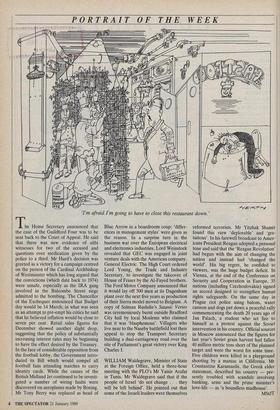PORTRAIT OF THE WEEK
'I'm afraid I'm going to have to close this restaurant down.'
The Home Secretary announced that the case of the Guildford Four was to be sent back to the Court of Appeal. He said that there was new evidence of alibi witnesses for two of the accused and questions over medication given by the police to a third. Mr Hurd's decision was greeted as a victory for a campaign centred on the person of the Cardinal Archbishop of Westminster which has long argued that the convictions (which date back to 1974) were unsafe, especially as the IRA gang involved in the Balcombe Street siege admitted to the bombing. The Chancellor of the Exchequer announced that Budget day would be 14 March; in what was seen as an attempt to pre-empt his critics he said that he believed inflation would be close to seven per cent. Retail sales figures for December showed another slight drop, suggesting that the policy of substantially increasing interest rates may be beginning to have the effect desired by the Treasury. In the face of considerable opposition from the football lobby, the Government intro- duced its Bill which would compel all football fans attending matches to carry identity cards. While the causes of the British Midland Jet continued to be investi- gated a number of wiring faults were discovered on aeroplanes made by Boeing. Mr Tony Berry was replaced as head of Blue Arrow in a boardroom coup; 'differ- ences in management styles' were given as the reason. In a surprise turn in the business war over the European electrical and electronics industries, Lord Weinstock revealed that GEC was engaged in joint venture deals with the American company, General Electric. The High Court ordered Lord Young, the Trade and Industry Secretary, to investigate the takeover of House of Fraser by the Al-Fayed brothers. The Ford Motor Company announced that it would lay off 500 men at its Dagenham plant over the next five years as production of their Sierra model moved to Belgium. A copy of Salman Rushdie's Satanic Vet-;yes was ceremoniously burnt outside Bradford City hall by local Moslems who claimed that it was 'blasphemous'. Villagers who live near to the Naseby battlefield lost their appeal to stop the Transport Secretary building a dual-carriageway road over the site of Parliament's great victory over King Charles I.
WILLIAM Waldegrave, Minister of State at the Foreign Office, held a three-hour meeting with the PLO's Mr Yassir Arafat in Tunis. Mr Waldegrave said that if the people of Israel 'do not change . . . they will be left behind'. He pointed out that some of the Israeli leaders were themselves reformed terrorists. Mr Yitzhak Shamir found this view 'deplorable' and 'gra- tuitous'. In his farewell broadcast to Amer- icans President Reagan adopted a personal tone and said that the 'Reagan Revolution' had begun with the aim of changing the nation and instead had 'changed the world'. His big regret, he confided to viewers, was the huge budget deficit. In Vienna, at the end of the Conference on Security and Cooperation in 'Europe, 35 nations (including Czechoslibvikia) signed an accord designed to strengthen human rights safeguards. On the same day in Prague riot police using batons, water cannon and dogs put down a peaceful rally commemorating the death 20 years ago of Jan Palach, a student who set 'fire to himself as a protest against the Soviet intervention in his country. Official sources in Moscow announced that the figures for last year's Soviet grain harvest had fallen 40 million metric tons short of The planned target and were the worst for some time. Five children were killed in a playground shooting by a maniac in California. Mr Constantine Karamanlis, the Greek elder statesman, described his country — pre- sently troubled with scandals involving banking, arms and the prime minister's love-life — as 'a boundless madhouse'.
MStJT


























































 Previous page
Previous page